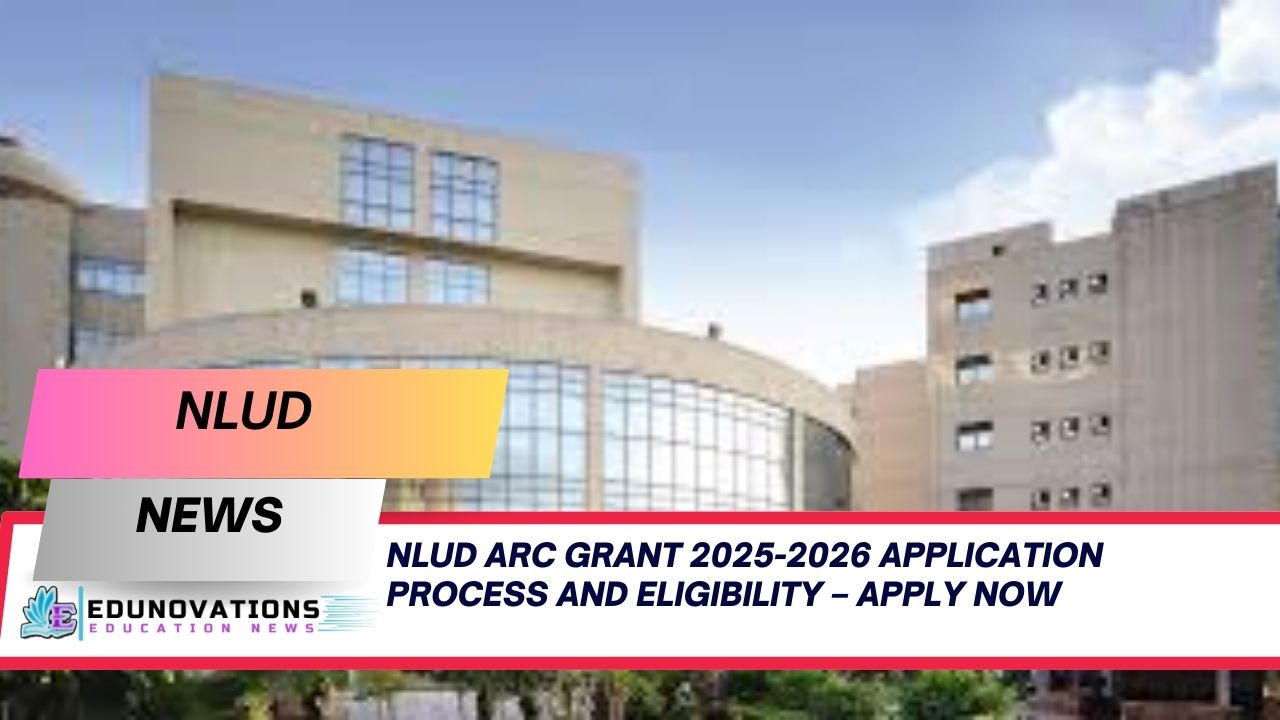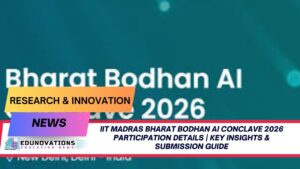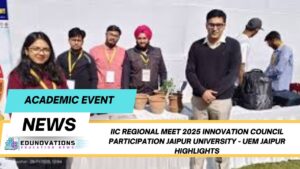Discover the NLUD ARC Grant 2025-2026 application process and eligibility criteria for the collaborative research funding. Learn about themes, grant amount, and how to submit proposals before Jan 15, 2026.
Introduction
The National Law University, Delhi (NLUD) has unveiled its inaugural NLUD ARC Grant 2025-2026 — an ambitious scheme aimed at promoting collaborative, multi-institutional research in law and social sciences across India. With a grant amount of ₹7.5 lakhs and a one-year funding window, this initiative presents a compelling opportunity for scholars and institutions alike. In this article, we outline the core details of this grant, eligibility conditions, thematic scope, application steps, and strategic considerations for researchers from smaller institutions or low-DA (domain authority) websites keen on generating high-value content around this call.
What is the NLUD ARC Grant 2025-2026
- The NLUD ARC Grant is designed to support multi-institutional collaborative projects — pushing the boundaries of traditional single-institution research. Lawctopus
- Each grant carries a funding of ₹ 7.5 lakhs, intended for a one-year research project. Two such grants will be awarded in this cycle.
- The grant is not meant for extension under ordinary circumstances. Projects must be completed within the funding year.
- NLUD explicitly states that awarded projects must be standalone and cannot be a sub-project of a larger ongoing project.
This initiative underscores NLUD’s vision to foster interdisciplinary and collaborative scholarship — recognizing that modern socio-legal questions often span multiple institutions, disciplines, and expertise.
Who Can Apply — Eligibility & Key Conditions
The eligibility norms and application conditions under the NLUD ARC Grant 2025-2026 are tailored to ensure genuine collaborative research across institutions:
- The applying project must be “multi-institutional collaborative” — meaning more than one institution must be involved.
- Applicants are required to obtain a No Objection Certificate (NOC) from all participating institutions before submitting their proposal.
- The proposal should be a standalone project (i.e. not part of a larger preexisting project).
- Given that the grant is time-bound (one year), applicants must prepare a project plan that can realistically be completed within that period and convincingly demonstrate feasibility and intended deliverables.
Such conditions are meant to ensure accountability, clarity, and genuine collaboration — thereby enhancing the quality and impact of research supported under this grant.
Thematic Scope — What Kind of Projects Are Invited
The NLUD ARC Grant 2025-2026 welcomes proposals spanning a broad and contemporary range of socio-legal and interdisciplinary themes. Among the thematic areas listed:
- Law and Technology
- Labour, Environment and Sustainable Development
- Market, Competition and Society
- Women, State and Judicial Approaches
- Citizenship and its Discontents
- Law, Inequity and Welfare Schemes
- Law and Communities; Spatiality, Planning and Exclusion
- Intellectual Property Rights and Human Rights
- Socio-Political Movements and Law
- Pluralism, Normative Diversity and Legal Consciousness
- Law, Business and Governance
- Theoretical and Methodological Approaches to Legal Education
- Degrowth, Development and Sustainability
These themes reflect pressing issues in contemporary India — from social justice, environmental sustainability, urban planning, to technology and human rights
For scholars and institutions working at the intersection of law and social sciences — including human rights, environmental law, socio-economic inequalities, community studies — this grant offers a unique chance to fund high-impact interdisciplinary research.
How to Apply — Key Steps & Deadline
Applying for the NLUD ARC Grant 2025-2026 involves a clear, structured process. Here’s what prospective applicants need to do:
- Obtain NOC from all participating institutions. Since the grant supports multi-institutional collaboration, every participating institution must formally consent.
- Prepare a standalone, ready-to-execute project proposal. Ensure the research plan is detailed, with scope, objectives, timeline, methodology, and deliverables — and appropriately scoped for one year.
- Ensure feasibility and clarity. Because the grant duration is limited to one year and extensions are rare, proposals must show a realistic plan for completion within that period.
- Submit the online application before the deadline — 15 January 2026 (11:59 PM IST).
Given the competitive and ambitious nature of this grant, applicants are advised to submit polished proposals well before the deadline, with all required documentation in place.
Why NLUD ARC Grant Matters — Significance for Indian Legal & Social Research
The launch of NLUD ARC Grant 2025-2026 marks a significant moment in India’s academic and research landscape — especially for socio-legal studies. Here’s why it matters:
- Encourages collaboration across institutions: Many social and legal problems in India are multifaceted — combining law, policy, society, environment, economy. The grant’s multi-institutional framework encourages pooling of expertise, data, regional insights, and cross-disciplinary methods.
- Bridges law and social sciences: By welcoming themes that go beyond traditional legal scholarship (e.g. environment, welfare, planning, governance), the grant encourages a more holistic, context-sensitive understanding of law in society.
- Boosts research capacity beyond elite institutions: Scholars from smaller colleges or institutions with limited resources can collaborate with better-equipped peers — democratizing research production.
- Timely relevance: Themes like environment, welfare, inequality, governance, and technology resonate with current national and global discourses — meaning research outcomes could influence policy, academia, and public debates.
In a country grappling with complex socio-legal challenges — environmental degradation, urbanization, social inequality, governance reforms — such a grant can pave the way for meaningful, actionable scholarship.
How Low-DA / Emerging Websites Can Benefit — Content Strategy Suggestions
If you run a website with low domain authority (DA) and wish to leverage this news for SEO, here’s how to turn this announcement into a high-value content asset:
- Publish a detailed explainer article — similar to this one: summarise what NLUD ARC Grant is, why it matters, eligibility, how to apply. Use the primary keyword NLUD ARC Grant 2025-2026 application process and eligibility as the focus keyword.
- Create derivative content: For example:
- “Top 10 Thematic Areas under NLUD ARC Grant & What They Mean for Researchers”
- “How to Draft a Successful NLUD ARC Grant Proposal: Tips & Checklist”
- “Collaborating Across Institutions in India: Challenges & How NLUD ARC Grant Can Help”
- Link to authoritative sources: Use an external link to a reliable site (e.g. “Mart Ind Infotech” as a generic external reference site), and internal links to your own related posts (like current affairs, notes, syllabus — e.g., link to your site’s Current Affairs page or Notes).
- Add expert insight: You could interview a legal scholar or academic — or add commentary on why collaborative socio-legal research is important in India. This boosts E-E-A-T (Expertise, Experience, Authoritativeness, Trustworthiness).
- Target niche traffic with long-tail keywords: Because the announcement is niche, using long-tail keywords reduces competition and improves chances of ranking quickly.
Additional Context & Expert Insight
The emergence of funding programs like NLUD ARC Grant reflects a broader shift in legal academia — from rigid, doctrinal scholarship towards interdisciplinary, socially grounded, empirical, policy-relevant research.
Legal research in India has often been criticized for being too theoretical or detached from ground realities. In recent decades, socio-legal research — combining law, sociology, economics, environment, human rights — has gained prominence. Grants such as NLUD ARC can catalyse this shift by providing financial support, institutional legitimacy, and collaborative frameworks.
Moreover, collaborative grants help overcome institutional limitations. Many colleges across India lack robust infrastructure for empirical research or publication. Collaboration with better-resourced institutions can democratize research output, enabling voices from varied geographies, communities, and social backgrounds to be heard.
From a policy perspective, outcomes of such research can feed into real-world debates: on environmental justice, labour law, welfare schemes, urban planning, human rights, social exclusion. The themes outlined by NLUD map closely to India’s developmental challenges — making the grant not just academically relevant, but socially and politically significant.
Conclusion
The NLUD ARC Grant 2025-2026 represents a major opportunity for Indian legal and social-science scholars to undertake ambitious, collaborative, interdisciplinary research. For those considering applying, understanding the NLUD ARC Grant 2025-2026 application process and eligibility is the first step — but a well-planned, realistic, and socially relevant proposal can make the difference. For low-DA or emerging websites, covering this announcement — and creating related content — can help you gain audience, build authority, and potentially rank quickly on search engines.
As India navigates complex socio-legal challenges, funding mechanisms like this grant can play a crucial role in fostering research that matters.
Toppers Use Mind Maps to score more than 95%
NCERT Class 11th Commerce Mind Maps
Add to cartOriginal price was: ₹999.00.₹199.00Current price is: ₹199.00.NCERT Class 12th Chemistry Mind Maps
Add to cartOriginal price was: ₹199.00.₹75.00Current price is: ₹75.00.NCERT Class 12th Commerce Mind Maps
Add to cartOriginal price was: ₹999.00.₹199.00Current price is: ₹199.00.NCERT Class 12th Science Mind Maps
Add to cartOriginal price was: ₹999.00.₹199.00Current price is: ₹199.00.NCERT Mind Maps For Class 10th
Add to cartOriginal price was: ₹999.00.₹199.00Current price is: ₹199.00.
Purchase Today
FAQs
- What is NLUD ARC Grant 2025-2026 application process and eligibility?
The grant is open for multi-institutional collaborative projects. Applicants must obtain a No Objection Certificate (NOC) from all participating institutions and submit a standalone project proposal by the deadline. - What is the grant amount offered under NLUD ARC Grant 2025-2026?
The grant amount is ₹ 7.5 lakhs for a one-year project. - What kind of thematic areas are eligible under this grant?
Eligible themes include Law and Technology; Labour, Environment and Sustainable Development; Welfare Schemes; Human Rights; Governance; Spatial Planning; Socio-political Movements; and other socio-legal issues. - Can researchers from small or low-tier institutions apply for this grant?
Yes — the grant is designed to support multi-institutional collaboration, enabling researchers from smaller institutions to partner with other institutions and benefit from joint resources and expertise. - Is extension of project duration allowed under NLUD ARC Grant?
Generally no — the grant is meant for a one-year standalone project. Extension may only be granted under exceptional circumstances. - What is the last date to apply for NLUD ARC Grant 2025-2026?
The application deadline is 15 January 2026 (11:59 PM IST). - Do all participating institutions need to provide a formal agreement for collaboration?
Yes — applicants are required to secure a No Objection Certificate (NOC) from all collaborating institutions before submission. - Can the proposed project be part of some larger ongoing research work?
No — the grant requires the proposal to be a standalone project, not a component of a larger or existing project. - Why is multi-institutional collaboration emphasized in the grant?
Because many socio-legal issues in India span disciplines, geographies, and institutional capacities. Collaboration enables pooling of expertise, resources, and perspectives — leading to more robust and socially relevant research. - How can emerging educational websites benefit from covering this grant news?
By publishing detailed, SEO-optimized articles on NLUD ARC Grant 2025-2026, using long-tail keywords such as NLUD ARC Grant 2025-2026 application process and eligibility, they can attract niche academic traffic, build authority, and rank faster on search engines.














